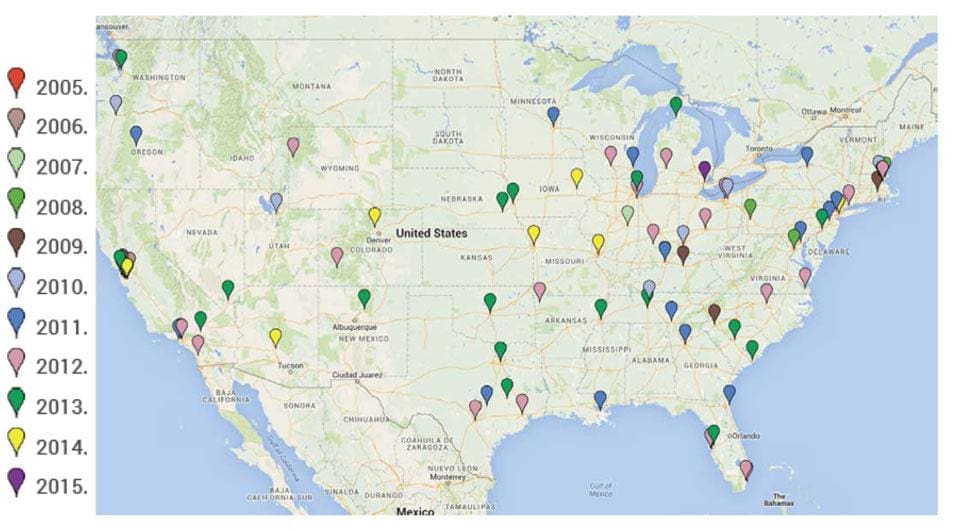For young companies with passionate founders, minimum viable products and big dreams, membership in a business accelerator can provide the thrust needed to clear barriers to growth. Top slots come with teams of expert advisers and six-figure funding, plus the halo effect of being accepted into a prestigious program, so it’s easy to see why competition is stiff.
Still, entrepreneurs hold plenty of cards. Accelerators are fueled by fresh ideas, and their investors understand that the goal is a win/win. You gain cash and access to legal, marketing, financial and operational expertise to refine your business plan. In return, the accelerator gets equity with the expectation of high growth and future returns. You’re bringing value to the table, and the number of quality accelerators is increasing — and not just in Silicon Valley.
Founders from Austin, Texas to Bangor, Maine and cities and towns in between have room now to be selective. Here’s what you need to know to find the best accelerator to help your company level up.
What Is a Business Accelerator?
A business accelerator provides early-stage companies with funding, access to expert advisers, peer mentorship and practical support, such as workspaces, marketing and enabling technology. Membership is by application, and many accelerators specialize, whether by vertical, geography or type of company accepted. You’ll likely be part of a cohort; that is, a set-size class of businesses with common characteristics, whether product type or target market, admitted at one time for the duration of the program. Programs last from three to six months and culminate in a Demo Day, where graduates showcase their businesses to investors, press and potential customers.
In exchange, an accelerator’s investors receive equity, usually 7% or less, and other considerations, such as options to purchase additional shares at a discount and the right to weigh in on key decisions, like new financing rounds, executive or board additions or acquisition offers. They will also ask for attestations including that the company is in fact incorporated, its estimated capitalization and outstanding equity, how many options have been granted, intellectual property (IP) ownership and descriptions, whether IP is patentable and whether patents have been applied for or received.
Founding teams that enter an accelerator with a well-honed strategy and the ability to put advice from marketing, sales, operations, finance and other experts into practice will benefit most. Enroll too early and the experience may do more harm than good. Companies without MVPs (minimum viable products) or reasonably well-developed marketing plans may be better served by an incubator.
Accelerators vs Incubators: What’s the Difference?
Business incubators and business accelerators are sometimes lumped together, and in fact, newer hybrid programs are emerging. However, there are key differences.
Business incubators accept companies at very early stages, even before there’s a minimum viable product or marketing plan. Founders may stay in the incubator community for years. Support tends to be in the form of material assistance, like free or inexpensive workspaces and enabling technology at a steep discount, and help applying for incorporation or patents, for example. An incubator may connect a startup with angel or VC investors, but it’s non-dilutive, meaning it doesn’t take equity in exchange for services.
Business accelerators are not open-ended; companies enroll for a fixed program, normally six months or less. The experience can be intense, with a lot of learning, networking and product and service refinement crammed into a short period of time. Like incubators, a key benefit is the connections and mentorship provided. Funding comes from the accelerator via its investors in exchange for equity. The accelerator may also help a company hire executives, acquire new customers or assemble a board of directors.
Accelerator or Incubator? Key Characteristics
| Incubator | Accelerator | ||
| Open-ended timeframe measured in years | Compressed timeframe, usually six months or less | ||
| Non-dilutive. Company may pay modest fees, rent | Company provides equity, usually via common stock | ||
| Very early stage | Early stage but with MVP, strategy | ||
| May enter and exit on a rolling basis | Set cohorts with little flexibility on entry/exit | ||
| Range of funding sources, including nonprofits | Funding from investors seeking ROI | ||
| Both and Hybrid Programs | |||
| Provide advice from a range of experts: financial, legal, marketing, operations, technical | |||
| Offer trainings and peer networking opportunities | |||
| Selective admission and may have set criteria, such as founder demographic, geographic location, vertical or company type | |||
Key Takeaways
- Business accelerators provide founders with the mentorships, funding and core skills they need to improve and scale their companies.
- Investors in business accelerators receive benefits including a stream of well-vetted entrepreneurs and equity in promising young companies.
- Potential gotchas for founders include entering an accelerator too early and not carefully reading the contract fine print.
How Do Business Accelerators Work?
Accelerators offer a variety of support and investment opportunities for early-stage companies in return for equity. Investors, both individual and corporate, find accelerators attractive because they have people skilled at the diligence work of vetting founders, product concepts and business plans. Investors may purchase shares in an accelerator’s overall portfolio and/or in the startups themselves, with options to invest more in the future. Accelerators also provide early-stage investors with a number of assurances, such as that a company is properly incorporated and that its IP is patentable.
From a founding team’s perspective, business accelerators work for the fledgling business by providing a deep bench of expertise, invaluable peer connections and much-needed capital. An accelerator is literally invested in the entrepreneurial success of its graduates. An accelerator cohort is also a sounding board, where founders can bounce ideas off peers and refine business plans.
A good example of how these organizations function is Capital Factory, a top accelerator based in Austin.(opens in new tab) It accepts between 10 and 20 companies each quarter and in 2021 acquired over $25 million worth of investment rights. Its portfolio companies receive help raising additional funding and acquiring customers, coworking space, free and low-cost technology, a dedicated advocate and access to a mentor network of top investors and experts.
Its focus is technology and select healthcare, consumer and consumer packaged goods businesses, which receive investments ranging from $50,000 to $250,000. In return, Capital Factory receives stock worth 1% of the portfolio company and rights to take part in subsequent funding rounds.
Accelerator cohorts take part in some sort of graduation, commonly a demo day where each founder team discusses what they’ve learned and pitches peers, investors, media even potential customers.
Types of Business Accelerators
Not all business accelerators are alike. Besides geographic, demographic and sector specializations, some accelerators are nonprofits, others incorporate elements of incubators to nurture very-early-stage startups and others prefer to work with more advanced founders.
Entrepreneurs considering where to apply should be aware of key distinctions.
Seed
A seed, or early-stage, business accelerator focuses on fledgling startups by providing seed funding. Some seed accelerators are nonprofits and funded by large companies — often technology firms — and investors looking to give back and empower entrepreneurs from diverse communities.
Besides cash, seed-stage companies often need help getting their financials and technology stacks in place and refining their products and marketing strategies. The peer networking, mentoring and professional advisers provided by seed accelerators are invaluable for these efforts.
Second-Stage
The emphasis of a second-stage business accelerator is on companies that are no longer brand-new startups, exactly, but are not quite mature, either operationally or in terms of business strategy. In funding parlance, second-stage funding follows seed/startup rounds.
Second-stage companies are often looking to become more profitable and competitive, acquire larger customers, launch new product lines and/or enter new markets. Some need guidance on adding functional areas, for example, internal HR departments. A second-stage accelerator may look a lot like a management consulting practice geared to a specific growth stage.
Comparison Chart
Business accelerators fall on the spectrum of traditional funding tiers
| Tier | Adviser | |
| Pre-seed funding | Incubator | Often "bootstrapping" stage where founders tap savings, credit and friends and family |
| Seed funding | Seed accelerator, angel investor | Company has a proven concept and nascent business plan, needs cash to refine, produce product |
| Series A | Seed or second-stage accelerator | Company has a vetted concept backed by a business plan and more solid financial footing, is looking to add key roles |
| Series B | Second-stage accelerator | Company is seeking to increase market share, acquire new customers and hire on a larger scale |
| Series C | Management consulting firm | At this stage, a company has established itself and needs capital to expand operations and potentially make its own acquisitions or investments |
There are also hybrid options. The Fund at Hula,(opens in new tab) for example, is a non-traditional accelerator that has elements of an incubator.
“Rather than cohort-based programming, we incubate Vermont-based startups by offering mentorship, connectivity, access to capital and premium office and coworking space,” said Russ Scully, Hula’s founder and CEO.
The Hula campus was designed to bring entrepreneurs and a community of experts together in a collaborative environment.
“We believe in the power of networks,” said Scully. “A rising tide floats all boats’ is our ethos. We encourage our founders to cross-pollinate and support one another as they scale. We invest in seed and early-stage, typically as startups are developing their go-to-market strategy, and see them through subsequent stages of growth and fundraising.”
Benefits of Business Accelerators
Going back to our example of Austin’s Capital Factory, the accelerator’s portfolio companies are promised a competitive advantage in attracting talent, investors, customers and advisers based on the group’s reputation and track record. In a practical sense, startups get cash, coworking space in one of the most expensive real estate markets in the country, hosting credits for cloud infrastructure services and other technology providers and advice from the group’s network in exchange for equity and future investment options.
Founders also gain the most valuable commodity: time. The Capital Factory’s intensive programs run for three months, and in that span portfolio companies have, according to the accelerator, access to:
- Technology and business leaders, including visiting investors and VIPs
- Educational lectures, videos, and workshops
- An investor relations team dedicated to helping companies achieve the next funding round
- Six months of free coworking memberships for employees
- More than $250,000 in potential total credits from technology providers that the accelerator says can last up to two years
And, after the intensive three-month program, companies can continue to draw on program benefits and fundraising expertise.
Other accelerators have different models.
The Fast Forward accelerator,(opens in new tab) based in San Francisco, Calif., accepts only early-stage tech and healthcare nonprofits that have built MVPs. Its program also runs for three months and offers similar benefits to Capital Factory, but enrollees in its accelerator receive $25,000 philanthropic grants and advice specific to the nonprofit sector. The accelerator takes no equity.
New Mexico’s American Indian Business Accelerator(opens in new tab) program serves Native American entrepreneurs in fields from farming to artistry and mental health services. Benefits include workspaces, access to equipment and software and expert advisers. While the accelerator doesn’t itself provide funding, it helps members access grants, government contracts and low-cost loans and has a portfolio of patents that businesses can license.
Michigan’s Rise Pre-Seed Fund III(opens in new tab) invests in the state’s startups. Companies can be for-profit LLC, C-Corp or S-Corp, must have been in business for less than seven years and be based in the state. Investments range from $50,000 to $250,000 per portfolio company and can be in equity; convertible debt, which is a mix of loans and equity; or SAFE (simple agreement for future equity) in which the accelerator’s investors receive the right to buy stock in a future equity round. The latter is an attractive option for founders because it doesn’t lock them into a valuation at an early stage.
Who Invests in a Business Accelerator
Monetary investors in business accelerators include venture capitalists, angel investors, educational institutions and local, state and federal governments. These investors benefit from the work the accelerator does to search out and vet young businesses.
In-kind investors include technology companies that donate free and reduced cost software and/or services credits and sometimes mentorships and pro bono work by their executives and employees.
Some cloud providers give hosting credits to accelerator member companies, while providers of core business enablement tools, including financial, ERP, productivity and ecommerce, will often provide free or reduced cost access to their software.
This benefits the startups, which gain tools on par with what more established businesses in their vertical industries use. The software providers both help grow the overall economy and, on a more practical level, introduce promising new companies to their products in the expectation that they will in time become paying customers.
Who Uses Business Accelerators?
Founders who use business accelerators are often seeking a community of peers and advisers who can help them grow as business leaders. Because of the open nature of the accelerator application process, startups outside tech hubs or without a rolodex of investors can get their ideas funded.
Other key characteristics of companies that use business accelerators:
They have MVPs and working business plans and now need an infusion of cash as well as assistance with strategic planning, hiring, financial and cash flow management, customer acquisition and enabling technology.
They are open to refining their products and plans. Founders who use business accelerators need to have open minds. They may hear tough but constructive criticism from experienced advisers.
They are open to giving the accelerator equity as well as in some cases a level of control over growth and future investment decisions.
They can devote 100% of all founders’ time during the cohort period to learning, networking and developing their product. These programs are intense and immersive.
Founders from diverse communities are joining accelerators in greater numbers, for good reason.
“Today, 80% of black-owned businesses fail within the first year, compared with 20% of all businesses,” said George Ploss, director, NetSuite Business Accelerator. “We’re missing a market opportunity to grow a large segment of our economy.”
How Do I Choose the Right Business Accelerator for My Company?
Here are five questions to help build a shortlist of accelerators your company should consider:
- Where are you and your cofounders based? While you might be intrigued by a hot program in San Francisco, if you and your team live in Ohio, be realistic about the cost of living, which can chew up cash, and the disruption of moving. Accelerators prefer to work with teams rather than with a single founder, so get everyone aligned on where to apply.
- Are you a member of a diverse community that’s underrepresented among business owners? There are programs aimed specifically at leveling the playing field and addressing the unique needs of Black, LatinX, Native American and veteran founders as well as woman-owned businesses and those founded by people with disabilities.
- Do you reside in a disadvantaged or otherwise vulnerable area? There are programs designed to help revitalize communities. The new Justice40 Accelerator(opens in new tab) will provide $25,000 unrestricted philanthropic grants to organizations working in areas vulnerable to climate change, for example.
- Is your company highly specialized? Today there are accelerators for most startups, from nonprofits to agribusiness to cybersecurity and cryptocurrency. The more niche your business, the more you’ll benefit from a specialized accelerator.
- How much equity and control are you willing to give up? If dilution is a sticking point, consider programs, like the U.S. Small Business Administration’s Growth Accelerator Fund Competition, that award grants and nonrepayable prizes. Or, look into an incubator, angel funder or a maker space in your area.
A business accelerator is not the only option for accessing capital, expert advice and peer support. And of course, always have an attorney review the fine print in any contract.
Business Accelerator Application Process
Once you have a short list of business accelerators that interest you, it’s time to make your application as competitive as possible.
First, decide what cohort you wish to join based on your team’s availability and when you expect to have an MVP and reasonably firm business plan.
Do research on the accelerator before you fill out the application. At minimum you’ll need your product elevator pitch, bios on all founders, your target market, information on any existing customers and up-to-date financials. The accelerator will want to know if you’ve already awarded shares or accessed other funding sources. But dig deeper: Look to find commonalities among the startups that have been accepted to previous cohorts. Highlight where your business matches up to those demonstrated priorities.
Experts advise keeping responses concise, targeted and well-written. Don’t use too much jargon if you can avoid it. Insert links to videos, decks, social and LinkedIn profiles and other assets rather than loading up an application. List relevant references upfront. Have several people read through it before hitting “submit.”
As you wait to learn if you’ll get through the pre-screening phase, start gathering documentation and refining your pitch with a focus on revenue potential and why your product or service addresses an unmet market need.
The next step is the interview. If possible, meet face-to-face, and practice — mock interviews with accelerator alumni are particularly helpful. If you must do a virtual interview, make sure you have a quiet room, solid Wi-Fi and no chance of your cat walking across your keyboard.
Expect to have no more than 30 minutes — and maybe less — to sell the interviewer on why your company is a great investment that will benefit from the accelerator and be a productive and contributing member of the cohort. The culture of the organization will dictate the style of the interview. Y Combinator is known for short, intense sessions, for example. Focus on differentiation and what your founders bring to the table.
If you’re notified that you made it to the evaluation phase, start gathering documentation including:
- Incorporation, patent and IP ownership documents
- A capitalization table showing equity and options/vesting schedule data in detail
- Any funding received, such as from angel investors, banks, friends and family or Small Business Innovation Research (SBIR) and Technology Transfer (STTR) programs
- An updated business and marketing plan
Expect to authorize credit and background checks for founders and open-book accounting during your tenancy and potentially sign an NDA.
You should ask the accelerator for a few things, too, such as its conflict-of-interest policies, any program costs or fees that will reduce the investment, specific pro-rata or first-refusal rights governing future stock purchases and funding rounds or acquisition offers.
You may want to include a sunset date specifying when the accelerator no longer has the right to financial, strategy and other insights into your company.
3 Financial Considerations When Evaluating an Accelerator Offer
- Valuation: The amount an accelerator offers for common or preferred stock is based on the company’s pre-money valuation. Say an accelerator offers $50,000 for 6% equity and deducts a $3,000 fee. It’s valuing your company at $783,333. A convertible note or SAFE does not translate to a valuation.
- Value of its services: What value do you place on the tangible (office space) and intangible (mentorships, networking) elements of the accelerator offer? Six free months in a swanky coworking hub with catered lunches and a concierge is great, but if you can’t pick up rent, factor in the cost of moving to more affordable space.
- Offer structure: Accelerators normally take shares of common stock and stipulate allowable dilution. Beyond that, does the contract contain options that could make your company less attractive or even ineligible for future funding?
History of Business Accelerators
The business accelerator concept emerged in 2005 in Cambridge, Mass. when Paul Graham, who had sold his company to Yahoo, and banker Jessica Livingston decided to offer a three-month boot camp to founder teams. That initial cohort comprised eight startups, and Y Combinator was born.
The concept really took off between 2008 and 2014, when the number of US-based accelerator programs grew from fewer than 20 to close to 200 and, importantly, spread across the country. No longer were accelerators confined to California and Massachusetts tech hubs.

Today, Crunchbase counts 1,048 accelerators in the United States alone. Even the U.S. Small Business Administration has gotten in on the trend. The agency’s 2021 Growth Accelerator Fund Competition and Small Business Innovation Research Catalyst programs awarded $5.4 million to 92 young companies.
Accelerate or Incubate: How to Choose
Incubators are for founders who still need a business plan and don’t yet have a viable product or service. They’re relatively open ended; founders may stay in the incubator for up to five years.
Accelerators are for companies that have proven MVPs, customers, a solid business plan, steady growth and are now ready to take their companies to the next level.
Ask yourself: Do we have an idea and need help translating it to a business concept? Do we need long-term mentoring and practical help?
At Hula, for example, the founders work hands-on with portfolio companies and advise across business operations, including fundraising strategy, team development and support through startup growing pains. If you need that level of help, an incubator or hybrid like Hula might be the right choice.
Companies looking for a reputable incubator can check out a directory of US Incubation Associations in a number of states and countries maintained by the International Business Incubation Association (INBIA). The group also hosts webinars and workshops for early-stage founders.
Accelerate With NetSuite
For both incubators and accelerators, expert advice and affordable top-tier software are draws that bring top founders. The NetSuite Accelerator program will provide both.
“The NetSuite Accelerator is not like a traditional accelerator, where it’s grant-funded or dilutive,” said Ploss. “We’re going to offer NetSuite at a deep discount to startups, because one of the things that these founders are really worried about is runway and cash management.”
NetSuite was founded with a mission to help entrepreneurs unlock business growth. More than two decades and customers later, its financial software is proven to help startups maximize their funding and lengthen their runways. The program will leverage experiences from NetSuite’s global customer community to provide access to the processes, best practices, guidance and technology required to achieve sustainable growth.
“We’re going to be sitting alongside these businesses, helping them create customer success stories,” said Ploss.
The program will offer:
NetSuite’s technology platform at a significant discount that equates to tens of thousands of dollars each year in savings.
Mentoring and strategic guidance from senior NetSuite executives, including founder and executive VP Evan Goldberg, as well as one-on-one sessions with subject-matter experts from across the NetSuite engineering, sales, operations and marketing teams.
Technical and functional support at no cost via a designated functional consultant and customer success manager to help ensure key milestones are met in a timely fashion.
Participants may also take part in educational events, including hackathons and buildathons, and will gain access to free NetSuite certification programs.
The program, which launched on Feb. 10 in recognition of Black History Month, will offer discounted software to all 700 businesses in the Capital Factory portfolio with a particular goal of accelerating Black business and building Black wealth. NetSuite Accelerator programs for women, LGBTQ, Veteran, disabled and LatinX communities will come online later this year.
Learn more about NetSuite Accelerator and see how to connect with us.
Bottom Line
In 2014, noted accelerator researchers Susan G. Cohen and Yael V. Hochberg defined a seed accelerator as “a fixed-term, cohort-based program, including mentorship and educational components, that culminates in a public pitch event or demo-day.”
Today, accelerators have kept that base mission and expanded to serve sectors from agribusiness to tech to nonprofits, healthcare and education. The US and global economies are powered by small businesses, and accelerators empower startups to make a difference for their employees, customers, investors and the economy as a whole.
Business Accelerator FAQs
Q: What does a business accelerator do?
A: A business accelerator helps founder teams that have viable products or services and well-developed business plans take their companies to the next level over a compressed timeframe. Accelerators do this by making a monetary investment, often in exchange for equity, and providing mentorship and material assistance. Specific functions include help with accounting and financials, business plan development, customer acquisition, networking and mentorships, HR, legal advice, marketing services and assistance with presentation and communication skills — the all-important “elevator pitch” that’s so critical in hiring top talent and gaining early customers.
Q: What is a new-business accelerator?
A: Very new businesses may do better by applying to business incubators versus business accelerators. An incubator has an open-ended membership timeframe, does not require an MVP (minimum viable product) and does not take an equity stake.
Q: How much does a business accelerator cost?
A: Accelerators are free or close to free for startups. In some cases, a fee for coworking space, software or other operating costs will be deducted from the monetary investment. Given the wide variety of accelerators, experts advise that founders ask upfront and then, if selected, check the fine print to see if there are costs built into the contract.
Q: How do I start a business accelerator?
A: First determine your model. Are you a corporation? If so, you can self-fund and -manage an accelerator or contract with an existing or a newly formed independent organization to find, vet and select startups and mentors. You could also collaborate with other companies in your industry to start an accelerator with the aim of strengthening your business ecosystem and identifying promising new technologies, ideas and talented entrepreneurs. Once you have the structure, sector and funding figured out, you’ll need to determine how long your program will run, parameters for admission, where you’ll locate the accelerator, what stake if any you will take in member businesses and what funding and mentorship you’ll provide.









